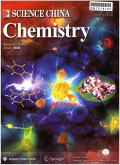- 钛学术文献服务平台 \
- 学术期刊 \
- 基础科学期刊 \
- 自然科学总论期刊 \
- 中国科学:化学(英文版)期刊 \
Chain-transfer-catalyst:strategy for construction of site-specific functional CO2-based polycarbonates
Chain-transfer-catalyst:strategy for construction of site-specific functional CO2-based polycarbonates
基本信息来源于合作网站,原文需代理用户跳转至来源网站获取
摘要:
Site-specific functional polymers are generally synthesized from functionalized chain transfer agents (CTA) in the presence of catalysts.However,the poor solubility or chemical inertness of CTAs may make polymerizations uncontrollable.Now,this issue is addressed by proposing a strategy of designing chain-transfer-catalyst (CTC) that combines catalyst and CTA into one.The occurrence of catalytic effect naturally triggers the chain transfer process to give catalyst-labeled polymers with well-defined structures.As a proof-of-concept,cobalt(Ⅲ) porphyrin catalysts with one,two and four hydroxyl groups act as efficient CTCs,giving the corresponding site-specific functional poly(propylene carbonate)s (PPC),diversifying the topology of polymers.Furthermore,porphyrin-capped PPCs with controllable Mn in the range of 1,000-16,800 g mol-1 were obtained by using monofunctional CTC (CTCOH).Moreover,different from traditional "catalyst+CTA" systems,a novel dynamic network transfer mechanism of CTCOH was proposed.This study provides a CTC strategy for the synthesis of site-specific functional polymers.

推荐文章
Biogeochemistry of methanogenesis with a specific emphasis on the mineral-facilitating effects
Syntrophy
Methanogenesis
Direct interspecies electron transfer
Magnetite
Wetland
Paddy fields
Data Transfer Object模式探讨
Data Transfer Object 三层应用 DataSet
混合熔融Li2CO3-Na2CO3-K2CO3体系表面张力计算
熔融碳酸盐
表面张力
模型
Butler方程
基于随机Hash-Chain的RFID安全协议研究
RFID系统
安全协议
Hash链
内容分析
关键词云
关键词热度
相关文献总数
(/次)
(/年)
文献信息
| 篇名 | Chain-transfer-catalyst:strategy for construction of site-specific functional CO2-based polycarbonates | ||
| 来源期刊 | 中国科学:化学(英文版) | 学科 | |
| 关键词 | |||
| 年,卷(期) | 2022,(1) | 所属期刊栏目 | ARTICLES |
| 研究方向 | 页码范围 | 162-169 | |
| 页数 | 8页 | 分类号 | |
| 字数 | 语种 | 英文 | |
| DOI | |||
五维指标
引文网络
引文网络
二级参考文献 (0)
共引文献 (0)
参考文献 (0)
节点文献
引证文献 (0)
同被引文献 (0)
二级引证文献 (0)
2022(0)
- 参考文献(0)
- 二级参考文献(0)
- 引证文献(0)
- 二级引证文献(0)
引文网络交叉学科
相关学者/机构
期刊影响力
中国科学:化学(英文版)
主办单位:
中国科学院
出版周期:
月刊
ISSN:
1674-7291
CN:
11-5839/O6
开本:
16开
出版地:
北京东黄城根北街16号
邮发代号:
创刊时间:
1950
语种:
eng
出版文献量(篇)
4060
总下载数(次)
0
总被引数(次)
11421
期刊文献
相关文献
推荐文献
- 期刊分类
- 期刊(年)
- 期刊(期)
- 期刊推荐
力学
化学
地球物理学
地质学
基础科学综合
大学学报
天文学
天文学、地球科学
数学
气象学
海洋学
物理学
生物学
生物科学
自然地理学和测绘学
自然科学总论
自然科学理论与方法
资源科学
非线性科学与系统科学
中国科学:化学(英文版)2022
中国科学:化学(英文版)2021
中国科学:化学(英文版)2020
中国科学:化学(英文版)2019
中国科学:化学(英文版)2018
中国科学:化学(英文版)2017
中国科学:化学(英文版)2016
中国科学:化学(英文版)2015
中国科学:化学(英文版)2014
中国科学:化学(英文版)2013
中国科学:化学(英文版)2012
中国科学:化学(英文版)2011
中国科学:化学(英文版)2010
中国科学:化学(英文版)2009
中国科学:化学(英文版)2008
中国科学:化学(英文版)2007
中国科学:化学(英文版)2006
中国科学:化学(英文版)2005
中国科学:化学(英文版)2004
中国科学:化学(英文版)2003
中国科学:化学(英文版)2002
中国科学:化学(英文版)2001
中国科学:化学(英文版)2000

 免费查重
免费查重










